Episodes
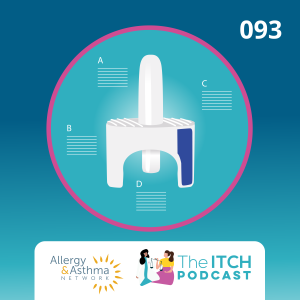
Thursday Nov 14, 2024
#93 - Neffy Epinephrine Nasal Spray: A New Needle-Free Treatment for Anaphylaxis
Thursday Nov 14, 2024
Thursday Nov 14, 2024
Curious About Neffy, the New Nasal Epinephrine Spray?
We’re diving into everything you need to know about Neffy, the new FDA-approved nasal spray for epinephrine. This groundbreaking, needle-free option provides an easy way to manage anaphylaxis in emergencies.
Dr. Sakina Bajowala joins Dr. Gupta and Kortney to explore Neffy’s unique nasal delivery system, what distinguishes it from traditional auto-injectors, and the science behind its development. With her expertise in allergy and asthma care, Dr. Bajowala walks us through Neffy’s FDA approval journey, the technology that powers the nasal spray, and how it’s changing the landscape of allergy treatment.
What We Cover in Our Episode on Neffy Nasal Spray:
- Why Neffy Nasal Spray is Unique: Dr. Bajowala explains why nasal epinephrine is an innovative choice for anaphylaxis treatment and when it may be preferable to injectables.
- FDA Approval for Neffy: We discuss the rigorous testing behind Neffy’s FDA approval, including studies conducted with actual patients post-approval.
- Intravail Technology in Neffy Nasal Spray: Learn about the advanced technology enabling rapid, effective absorption through the nasal passages for timely intervention.
- Considerations for Using Neffy Nasal Spray: We explore practical aspects of Neffy’s use, from nasal congestion to potential side effects.
- Neffy Dosing and Side Effects: Dr. Bajowala provides insights on dosing, including when a second dose may be recommended.
Helpful links:
- Neffy: https://www.neffy.com/
- Anaphylaxis: https://allergyasthmanetwork.org/anaphylaxis/
- Epinephrine: https://allergyasthmanetwork.org/anaphylaxis/what-is-epinephrine/
This podcast is made in partnership with The Allergy & Asthma Network. Thanks to ARS Pharma for sponsoring today’s episode. While they support the show, all opinions are our own, and sponsorship doesn’t influence our content or editorial decisions. Any mention of brands is for informational purposes and not an endorsement.

Tuesday Nov 12, 2024
#92 - How to Choose the Right Health Insurance Plan
Tuesday Nov 12, 2024
Tuesday Nov 12, 2024
It's that time of year again—open enrollment is here! Don't worry, we're here to help you choose the best health insurance for you and your family.
Lacey Varnon from the National Association of Medication Access and Patient Advocacy (NAMAPA) is back with Dr. Gupta and Kortney to discuss everything you need to consider when selecting a health insurance plan. This episode is all about understanding health insurance during open enrollment, from picking the right type of plan to ensuring your coverage fits your specific needs.
We cover essential aspects of open enrollment health insurance, including networks, premiums, copayments, and long-term medication coverage, so you can feel confident you're choosing a plan that works for you.
What We Cover in Our Episode on Open Enrollment Health Insurance:
- Key Factors to Consider: Lacey explains the importance of listing your doctors, diagnoses, and medications to ensure they're covered.
- Understanding Premiums, Deductibles, and Networks: Gain insight into how these elements impact your out-of-pocket costs and access to care.
- Plan Types – HMO, PPO, EPO, and POS: We break down each type of plan, including pros and cons, to help you decide which suits your healthcare needs.
- Special Considerations for Pharmacy Benefits and Long-Term Medications: Lacey offers advice on accessing necessary medications through your health plan or alternative methods if they are not covered.
- Navigating Open Enrollment with Family Needs in Mind: Tips on choosing a plan that considers your family member's medical needs and how you've used insurance in the past.
More resources about health insurance:
- Health Insurance Coverage in the United States
- Why was my prescription denied by insurance?
- Health Insurance for Asthma and Allergies
- Choosing the Right Health Insurance Plan
- Navigating Insurance Denials and Filing Appeals
- NAMAPA: National Association for Medication Access and Patient Advocacy
- Medication Access Network
This episode is made in partnership with the Allergy & Asthma Network and in collaboration the National Association of Medication Access and Patient Advocacy (NAMAPA). We thank Amgen for sponsoring this episode.
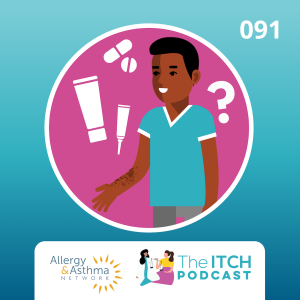
Thursday Nov 07, 2024
#91 - A Patient's Experience with Chronic Urticaria and Skin of Color
Thursday Nov 07, 2024
Thursday Nov 07, 2024
Discover Meka's journey with chronic hives in skin of color—a powerful story of resilience, self-advocacy, and building the right support system to get the care she deserves.
Emmeka, or "Meka," joins Dr. Gupta and Kortney to share her personal experience of living with chronic urticaria as a person with skin of color. Meka describes her journey from a lack of resources addressing hives on black skin to finding effective support and resources. She opens up about the long path to her diagnosis, the depth of her online research into chronic spontaneous urticaria (CSU), and the importance of finding knowledgeable, empathetic healthcare providers.
Meka’s optimism highlights how a proactive approach, a trusted care team, and a strong support network can make a difference in managing CSU.
What we cover in our episode about living with hives in black skin:
- Identifying Hives on Darker Skin: Meka shares the challenge of finding accurate images of hives on darker skin tones, which can complicate the first steps of recognizing your condition and create feelings of isolation.
- Advocating for Yourself in Healthcare: Meka provides strategies for effective self-advocacy during the diagnosis process, including tips for clear communication with healthcare providers.
- Building a Support Network: Meka emphasizes the value of connecting with others who share similar experiences, including support groups and online communities.
- Managing Symptoms & Minimizing Scars: Meka offers practical advice for managing CSU symptoms, reducing scarring, and strategies to avoid scratching.
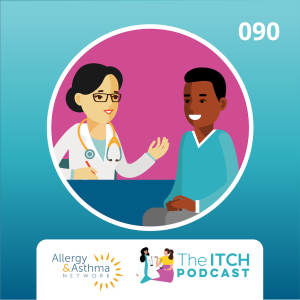
Thursday Oct 31, 2024
#90 - Challenges of Chronic Urticaria in Skin of Color
Thursday Oct 31, 2024
Thursday Oct 31, 2024
Chronic hives (urticaria) don’t look the same on everyone, and for people with skin of color, this can lead to confusion, misdiagnosis, and frustrating delays in treatment.
Dr. Ama Alexis joins Dr. Gupta and Kortney to discuss the unique challenges of diagnosing and managing urticaria in skin of color. Chronic spontaneous urticaria (CSU) can be especially tricky to identify in patients with darker skin tones, where traditional medical resources and visual aids often fall short.
Dr. Alexis explains how CSU appears differently in skin of color, discussing the difficulty of capturing hives on black and brown skin and offering advice for photographing hives to share with your doctor.
Dr. Gupta and Dr. Alexis also delve into the lack of diversity in clinical research and medical literature, exploring how these gaps contribute to mistrust and delays in treatment for patients of color. We end with a discussion on whether patients have better outcomes with providers who reflect the patient’s background.
What we cover in our episode about chronic urticaria in skin of color:
- Identifying CSU in Darker Skin Tones: Dr. Alexis shares insights on how hives appear on darker skin and gives tips for photographing hives accurately.
- Limited Visual Resources for Skin of Color: We discuss how a lack of reliable images for darker skin often leads to confusion and feelings of isolation.
- Provider Training and Diagnosis Delays: Dr. Alexis highlights how limited training in diagnosing skin conditions across all skin tones contributes to delays in care.
- Collaborating on a Treatment Plan: Tips for patients on advocating for inclusive care, with guidance on both over-the-counter and prescription options.
- Cultural Sensitivity in Healthcare: Dr. Alexis shares ways healthcare providers can foster shared decision-making to improve outcomes for patients of color.
More resources about chronic hives in skin of color:
- Chronic Urticaria Management, Resources & Glossary of Terms
- What is Chronic Urticaria
- Chronic Hives: 10 Actions to Support Mental Health
- Chronic Spontaneous Urticaria Series
This episode is produced in partnership with Allergy & Asthma Network, with special thanks to Genentech for sponsoring this episode.

Friday Oct 18, 2024
#89 - Health Insurance 101 for Doctors: Navigating Claims and Coverage
Friday Oct 18, 2024
Friday Oct 18, 2024
Are you frustrated by the health insurance approval process for medication?
Many patients may not know what their doctors are doing behind the scenes when dealing with health insurance, and many doctors may feel overwhelmed by this process. There is a silver lining! Tools exist to help patients and providers better navigate the complexities of health insurance.
Elizabeth Johnson joins Dr. G and Kortney to share her expertise on overcoming the hurdles of securing medication approvals. She explains the biggest challenges healthcare providers face when working with insurance companies. She offers practical tips to navigate the approval process more efficiently.
Together with Dr. G, they discuss the lack of health insurance education for providers and the burden this places on medical staff. They also explore available resources and tools for healthcare professionals and stress the importance of incorporating insurance education early in medical training.
What we cover in our episode about health insurance from the provider’s side:
- Provider Challenges: Elizabeth explains the common hurdles doctors face in securing medication approvals, from paperwork to insurance denials.
- Navigating Insurance Companies: We explore the complexities of insurance approvals, from prior authorizations to the importance of good note-taking.
- NAMAPA Toolkit: Elizabeth introduces the NAMAPA toolkit, designed to assist healthcare providers in navigating all aspects of health insurance.
- Insurance Education: We highlight the need for insurance education during med school, residency and fellowship.
- Health Insurance Resources: Elizabeth shares strategies to ensure healthcare professionals have the tools to handle medication approvals and the resources available from pharmaceutical companies.
More resources:
- Medication Access Coordinator Training From NAMAPA
- Health Insurance Coverage in the United States
- Why was my prescription denied by insurance?
- Health Insurance for Asthma and Allergies
- Choosing the Right Health Insurance Plan
- Navigating Insurance Denials and Filing Appeals
- NAMAPA: National Association for Medication Access and Patient Advocacy
- Medication Access Network
- MedicoCX
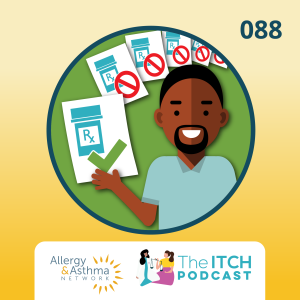
Thursday Oct 10, 2024
#88 - How to Get Your Meds Approved: Appealing Insurance Denial
Thursday Oct 10, 2024
Thursday Oct 10, 2024
Has your medication been denied? Now what?
Before patients can access medications—whether it’s inhalers or biologic therapies—they often have to jump through many hoops to get insurance approval. Navigating the world of health insurance approvals for medication can be overwhelming for both patients and providers. In this episode, we break down what to expect, what you can do, and how to advocate for yourself throughout the process.
Lacey Varnon from the National Association of Medication Access and Patient Advocacy (NAMAPA) joins Dr. G and Kortney to dive into the complex world of health insurance. Lacey shares insights into common reasons for medication denials, how to appeal them, and how patients and healthcare providers can work together for better outcomes.
What We Cover in Our Episode About Health Insurance Approvals for Medications:
- Health Insurance Basics: Understanding essential terms like payer and formulary.
- Navigating Insurance Approvals: Tips for a smoother process, understanding prior authorization, and common reasons for medication denials.
- Teamwork Between Patients and Providers: How patients and doctors can collaborate to improve chances of approval and streamline the documentation process.
- The Appeals Process: A step-by-step guide to appealing denials and ensuring access to necessary treatments.
- Support Programs & Resources: Insights into sample programs, bridge programs, and tools to help patients through the approval process.
More resources about health insurance denials and appeals:
- Health Insurance Coverage in the United States
- Why was my prescription denied by insurance?
- Health Insurance for Asthma and Allergies
- Choosing the Right Health Insurance Plan
- Navigating Insurance Denials and Filing Appeals
- NAMAPA: National Association for Medication Access and Patient Advocacy
- Medication Access Network
This episode is made in collaboration with the National Association of Medication Access and Patient Advocacy (NAMAPA). We thank Amgen for sponsoring this episode.

Thursday Oct 03, 2024
#87 - What biologic therapies are available for allergic conditions?
Thursday Oct 03, 2024
Thursday Oct 03, 2024
Are you curious about how biologic medications are transforming the treatment of asthma, eczema, allergies, and more?
Dr. Perdita Permaul joins Dr. Gupta and Kortney to discuss the available biologic medications for allergic conditions. We walk through the eight biologics currently available for allergic diseases, explaining how these medications target different parts of the immune system to treat allergic conditions more effectively than traditional medications.
Dr. Permaul explains how biologics have evolved since 2003 and how they are changing the way allergic conditions are treated. She also explains why some of the biologics treat multiple diseases, whereas some are only approved for one.
What we cover in our episode about the available biologics for allergic conditions
- How biologics work for allergic conditions: We unpack how biologic medications target specific parts of the immune system, reducing inflammation and improving the quality of life for patients with allergic diseases.
- History and evolution of biologics: Dr. Permaul walks us through the timeline of biologics, starting with Xolair in 2003 and how these treatments have expanded to target other conditions over time.
- Which biologics treat which conditions: From asthma and eczema to food allergies and nasal polyps, we break down which biologics are available and how they help patients with allergic conditions.
- Future of biologics: Dr. Permaul discusses the potential of biologics to be used for more conditions in the future, including ongoing research into food allergy treatments.
Biologics Cheat Sheet
Below is a list of the 8 biologics discussed in this episode. We have briefly outlined their mechanism of action along with the approved conditions and ages the drug is available for presecription.
Omalizumab (Xolair)
Xolair works by binding to IgE to prevent allergic reactions. It has since been approved for chronic hives, nasal polyps, and food allergies.
- Allergic asthma: 6+
- Chronic idiopathic urticaria (hives: 12+
- Chronic rhinosinusitis with nasal polyps (CRSwNP): 18+
- Food allergies:1+
Mepolizumab (Nucala)
Targets and blocks interleukin-5 (IL-5) play a key role in the activation and priming of eosinophils, a type of white blood cell that causes inflammation in asthma.
- Eosinophilic Asthma: 6+
- CRSwNP: 18+
- Eosinophilic Granulomatosis with Polyangiitis (EGPA): 18+
- Hypereosinophilic Syndrome: ≥6 months
Reslizumab (Cinqair)
Targets and blocks interleukin-5 (IL-5).
- Eosinophilic asthma: 18+
Benralizumab (Fasenra)
Binds to the IL-5 receptor, preventing eosinophils from growing and causing inflammation.
- Eosinophilic asthma: 6+
- Eosinophilic Granulomatosis with Polyangiitis (EGPA): 18+
Dupilumab (Dupixent)
Targets and blocks IL-4 and IL-13 to reduce inflammation
- Asthma: 6+
- Atopic Dermatitis: 6 months+
- CRSwNP: 18+
- Eosinophilic Esophagitis (EoE): 1+ (> 33 lbs)
- Approved for prurigo nodularis (PN): 18+
Tezepelumab (Tezspire)
Blocks thymic stromal lymphopoietin (TSLP).
- Asthma: 12+
Tralokinumab (Adbry, Adtralza)
Targets and neutralizes interleukin-13 (IL-13).
- Atopic dermatitis: 12+
Lebrikizumab (Ebglyss)
Targets and neutralizes interleukin-13 (IL-13).
- Atopic dermatitis: 12+ (> 40 lbs)
________
This podcast is made in partnership with The Allergy & Asthma Network. Thanks to Sanofi-Regeneron for sponsoring today’s episode. While they support the show, all opinions are our own, and sponsorship doesn’t influence our content or editorial decisions. Any mention of brands is for informational purposes and not an endorsement.
Disclaimer: This podcast is for informational purposes only and does not substitute professional medical advice. Always consult with your healthcare provider for any medical concerns.
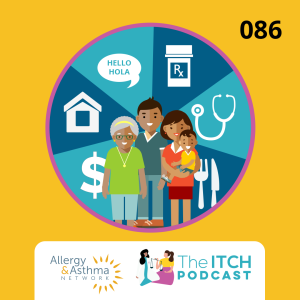
Thursday Sep 26, 2024
#86 - Food Allergy and its Impact on the Hispanic Community
Thursday Sep 26, 2024
Thursday Sep 26, 2024
Do food allergies impact all communities in the same way?
Dr. Vivian Hernandez-Trujillo joins Dr. G and Kortney to discuss the impact of health disparities on allergy outcomes within the Hispanic and Latino communities. Dr. Hernandez-Trujillo highlights the challenges posed by immigration status, language barriers, and cultural factors that contribute to unequal access to healthcare. These disparities often lead to difficulties in managing conditions like food allergies and asthma.
Dr. Hernandez-Trujillo emphasizes the importance of having an advocate in the healthcare system. Dr. G and Dr. Henandez-Trujillo discuss how building a strong relationship with your doctor is key to better outcomes.
Dr. Hernandez-Trujillo also addresses how cultural beliefs and practices within the Hispanic community influence the understanding and management of food allergies and the need for healthcare providers to enhance their cultural competency.
What we cover in our episode about health disparities in the Hispanic and Latino Communities:
- Health Disparities: Immigration status and language barriers significantly impact healthcare access and outcomes in the Hispanic community.
- Role of an Advocate: Why it is important to have an advocate and maintain a strong relationship with your healthcare provider to navigate the healthcare system.
- Challenges with Allergy Testing: What are the difficulties the Hispanic population faces with allergy testing, including issues related to insurance coverage?
- Cultural Beliefs and Practices: How cultural beliefs and practices within the Hispanic community influence the understanding and management of food allergies.
- Cultural Competency: How healthcare providers can enhance their cultural competency to better serve Hispanic patients.
About Our Guest
Dr. Vivian Hernandez-Trujillo is a board-certified allergist and immunologist at Nicklaus Children’s Hospital, where she specializes in treating allergies and immune conditions in children. Dr. Hernandez-Trujillo is deeply committed to addressing health disparities and improving healthcare access for underserved communities. She is actively involved in research and education, focusing on culturally competent care and advocating for patients within the Hispanic community. Her clinical interests include food allergies, asthma, and other allergic conditions.
More resources about XXX:
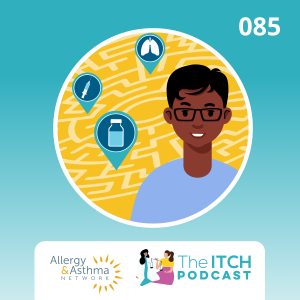
Thursday Sep 19, 2024
#85 - Navigating Biologic Therapy: What You Need to Know
Thursday Sep 19, 2024
Thursday Sep 19, 2024
Starting biologic therapy can be life-changing, but navigating the process isn’t always easy.
Dr. William Anderson joins Dr. Gupta and Kortney to break down the essential steps for starting biologic therapy, covering everything you need to know before beginning treatment. Biologics are at the forefront of managing chronic allergic diseases like asthma and eczema, offering targeted, personalized care that can improve patients’ quality of life. However, accessing these medications often requires navigating a maze of insurance approvals, prior authorizations, and specialty pharmacies.
We dive deep into the challenges patients face when starting biologics—understanding how to get coverage, managing co-pays, and coordinating with specialty pharmacies, all while handling the logistics of administering the medication. As someone who has just started a biologic herself, Kortney shares her own experience and reflects on how this episode provides the exact information she wished she’d had a few months ago.
What we cover in our episode about starting a biologic medication
- Getting informed before starting biologic therapy: Dr. Anderson explains why reviewing your medication’s patient website is a great first step. These resources often include videos and important details about the treatment.
- Navigating insurance and coverage: Insurance is often the biggest hurdle to starting biologics. Dr. Anderson highlights the role your doctor plays in this. Additionally, we discuss the importance of understanding your coverage, prior authorization, and working with specialty pharmacies to ensure you get the medication.
- Administration and storage of biologics: Whether it’s self-injection or infusion at a clinic, we explain how biologics are administered. Dr. Anderson also provides tips on proper storage, including refrigeration and traveling with biologics.
- Vaccines and biologics: Find out whether patients on biologic therapy should avoid live vaccines and how inactivated vaccines like the flu shot are generally safe to take.
- Long-term planning for biologics: Learn about the regular follow-ups and monitoring that are part of managing biologic therapy. Dr. Anderson discusses the importance of staying on track with your doses and follow-up appointments to ensure your biologic works effectively.
About our biologics expert, Dr. William Anderson
Dr. William Anderson, is a board-certified pediatric allergist and immunologist at Children’s Hospital Colorado. With a focus on treating children with complex allergic conditions such as asthma, eczema, and food allergies, Dr. Anderson is known for his patient-centered approach. He has extensive experience in biologic therapies and is dedicated to improving the quality of life for patients through personalized care. Dr. Anderson also actively participates in clinical research, staying at the forefront of advances in allergy and immunology treatments.
More resources about biologic therapies and the conditions they treat:
- A systematic review and expert Delphi Consensus recommendation on the use of vaccines in patients receiving dupilumab: A position paper of the American College of Allergy, Asthma and Immunology
- Biologic Medications Overview
- Understanding Asthma
- Allergies Explained
- Managing Food Allergies
- Understanding Eczema
- What if I Can’t Afford My Eczema Medication?
- What if I Can’t Afford My Asthma Medication?
This podcast is made in partnership with The Allergy & Asthma Network. Thanks to Sanofi-Regeneron for sponsoring today’s episode. While they support the show, all opinions are our own, and sponsorship doesn’t influence our content or editorial decisions. Any mention of brands is for informational purposes and not an endorsement.

Friday Sep 13, 2024
#84 - Biologic Medication Facts vs. Myths
Friday Sep 13, 2024
Friday Sep 13, 2024
Curious about what’s fact and what’s fiction when it comes to biologic medications?
We’re uncovering the truth behind the most pervasive myths about biologic medications with guest Dr. Cedric “Jamie” Rutland. Biologics are revolutionizing the treatment of allergic diseases like asthma and eczema, but misconceptions about their effectiveness, safety, and usage still persist. Dr. Rutland sets the record straight, debunking myths that may be clouding your understanding and decision-making process.
From whether biologics are a cure to concerns about long-term safety and side effects, this episode tackles the most common myths head-on. Dr. Rutland breaks down what biologic therapy truly offers, helping you make informed decisions about your treatment options.
What we cover in our episode about biologics facts
- Are biologics a cure? Dr. Rutland explains that biologics help manage symptoms, but they are not a complete cure.
- Biologics vs. traditional medications: We clarify how biologics differ from traditional medications in the way they target the immune system at a molecular level.
- Do biologics have severe side effects? We dispel myths about severe side effects.
- Long-term effectiveness of biologics: Dr. Rutland talks about how biologics maintain effectiveness over time for most patients.
- Do you have to stay on biologics for life? Learn how long patients typically stay on biologic treatments and whether they are lifelong therapies.
- When should biologics be considered? We address the myth that biologics are only for when all other treatments have failed and discuss when biologics should be introduced.
- Can you stop other medications while on biologics? Dr. Rutland explains that biologics are often used alongside other medications, not as a replacement.
- Who can use biologics? We debunk the myth that biologics are only for adults or that they can't be used if you have multiple health issues.
- Biologics and cancer risk: A common concern, but Dr. Rutland explains the actual risks and dispels the misconception that biologics cause cancer.
- Are biologics immunosuppressive? We discuss how biologics work on the immune system without broadly suppressing it like other treatments might.
- Biologics in medical practice: Dr. Rutland talks about the role of doctors and financial incentives, explaining why doctors prescribe biologics and how they make treatment decisions.
- Do biologics work immediately? Dr. Rutland sets the record straight on how long it typically takes for biologics to start working.
- Biologics are not experimental: Biologics have been widely studied and are not experimental treatments.
- Administration of biologics: We address the myth that biologics must be administered only in hospitals, explaining how patients can receive them at home or in clinics.
- Biologics are not interchangeable: Dr. Rutland explains the importance of sticking with the biologic prescribed specifically for a patient's condition.
- Prescribing biologics: While specialists typically prescribe biologics, we explore how general practitioners can also be involved in the process.
- Lifestyle changes and biologics: We discuss the misconception that biologics eliminate the need for lifestyle changes.
- Are biologics unnecessary for mild symptoms? Dr. Rutland explains that biologics are not only for severe symptoms but can also be considered for other cases.
More resources about biologic therapy and the conditions they treat:

